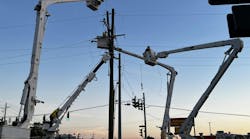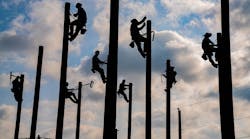-
Early Years
Born in Kalispell, Montana.
-
Married to Libby for 16 years and has a 12-year-old son, Zane, and 9-year-old twin girls, Molly and Raney.
-
Enjoys hunting in Montana and Alaska, fishing, spending time with his family and camping.
-
Day in the Life
Describes himself as easygoing yet hard working and very safety oriented.
-
Working Hot
Can't live without his belt, hooks, Klein pliers, 4-lb hammer, channel locks, a crescent wrench and a 6-ft ruler.
-
Inspired by his father, who has been in line work for 48 years for Flathead Electric and has a strong work ethic.
-
His favorite boss is Kurt Marsh, his crew's foreman. Kurt is family-oriented, and while he demands a lot from his crew, he is able to create a fun and safe work atmosphere.
Challenges and Rewards
I took business classes at the University of Montana, but it wasn't for me. My dad then took my brother and me out into the backyard to climb poles. That's where it began.
In 1994, I went to Boise State Line School. It was such a personal achievement when I topped out as a journeyman in the Local 125 union. I was elated when I passed the test for a union apprenticeship. I think my father was proud of me.
Safety Lesson
I was a totally green first-step apprentice. When I started at Bonneville Power Administration (BPA), I was nervous about hot-sticking 115-kV arms. I wanted to climb, but we weren't allowed to until we became fifth-step apprentices. I recall bringing lots of distribution tools like a Fargo wrench to the job site. The journeymen took them out of my belt and told me I wouldn't need those kinds of tools in transmission work.
Plans for the Future
I work as a journeyman lineman, so a typical day for me is to change hot and de-energized poles and crossarms, and change spacers, hardware and insulators on 115 kV through 500 kV. My crew and I just finished a month-long 500-kV insulator changeout. We also did about 30 miles of dead-ends and tangents. Right now, we are starting to do some line patrol in the high country and mountains. We are trying to look for problems on the power line.
At first, I was quite apprehensive about doing barehanding. I studied a lot and conducted research and then went through an extensive training program.
On our first project, we worked in 105°F weather in Oregon. We were wearing suits made of 25% stainless steel and 75% Nomex. Our socks, boots, bibs, jacket and gloves were all bonded together to create an equipotential zone around our bodies. We then accessed the wire with a 178-ft Bronto Man Lift and through rope access.
I've done barehand work off and on for two years now, and I feel like it is a useful tool when changing insulators to have one lineman on the bottom of the string assisting. Barehanding can be somewhat stressful until you get a level of comfort with it. You never want to get complacent. If you do the same thing over and over again, you have to be careful and not get too comfortable. It's like that with any aspect of line work.
Some of the biggest challenges are staying safe and ensuring that you and your coworkers don't get hurt. And traveling away from home extensively can be hard on a family.
Some of the more rewarding parts of the job are hiring and training apprentices. I served for about 10 years as a craft committee member, and I was able to help our apprentices by exposing them to different jobs, experiences and types of line work. It was great to see an apprentice mature as a lineman and as a person.
I've been fortunate enough not to have anyone severely injured beyond bumps and bruises. BPA's motto is that no job is so important and no service is so urgent that we can't take time to do our job safely. We teach our crews that speed comes with experience, and they must learn how to slow down and do a task correctly. This is especially important in hot work, so we stress how critical it is to do it in a safe manner.
-
plan on continuing to be a safe, productive lineman for BPA. I enjoy climbing too much to go into any form of management other than to work as a foreman in the field.
-
was 29 when I started doing line work. I know my 12-year-old son already wants to be a lineman. It's a great career for anyone who is motivated and wants to work hard and be part of a team.

